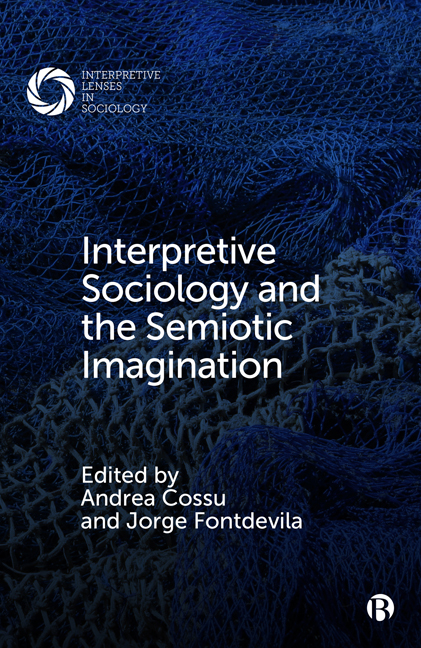Book contents
- Frontmatter
- Contents
- Series Editors’ Preface: Interpretive Lenses in Sociology—On the Multidimensional Foundations of Meaning in Social Life
- Notes on Contributors
- Introduction: Interpretive Sociology and the Semiotic Imagination
- 1 Marked and Unmarked: A Semiotic Distinction for Concept-driven Interpretive Sociology
- 2 Blumer, Weber, Peirce, and the Big Tent of Semiotic Sociology: Notes on Interactionism, Interpretivism, and Semiotics
- 3 Collective Agency: A Semiotic View
- 4 Theorizing Side-directed Behavior
- 5 Cultural Syntax and the Rules of Meaning-making: A New Paradigm for the Interpretation of Culture
- 6 Memory, Cultural Systems, and Anticipation
- 7 Stigma-embedded Semiotics: Indexical Dilemmas of HIV across Local and Migrant Networks
- 8 Supremacy or Symbiosis? The Effect of Gendered Ideologies of the Transhuman versus Posthuman on Wearable Technology and Biodesign
- Index
5 - Cultural Syntax and the Rules of Meaning-making: A New Paradigm for the Interpretation of Culture
Published online by Cambridge University Press: 20 January 2024
- Frontmatter
- Contents
- Series Editors’ Preface: Interpretive Lenses in Sociology—On the Multidimensional Foundations of Meaning in Social Life
- Notes on Contributors
- Introduction: Interpretive Sociology and the Semiotic Imagination
- 1 Marked and Unmarked: A Semiotic Distinction for Concept-driven Interpretive Sociology
- 2 Blumer, Weber, Peirce, and the Big Tent of Semiotic Sociology: Notes on Interactionism, Interpretivism, and Semiotics
- 3 Collective Agency: A Semiotic View
- 4 Theorizing Side-directed Behavior
- 5 Cultural Syntax and the Rules of Meaning-making: A New Paradigm for the Interpretation of Culture
- 6 Memory, Cultural Systems, and Anticipation
- 7 Stigma-embedded Semiotics: Indexical Dilemmas of HIV across Local and Migrant Networks
- 8 Supremacy or Symbiosis? The Effect of Gendered Ideologies of the Transhuman versus Posthuman on Wearable Technology and Biodesign
- Index
Summary
Introduction
Ever since its emergence from the sea foam of anthropology's cultural turn, cultural sociology has been focused almost entirely on meaning and structure. But should it be? Should cultural sociology lavish the entirety of its intellectual affection on this pair of favored children? That is the question this chapter takes up, a question that is sure to sound surly to the ears of the initiated. After all, “For the cultural sociologist, meaning drives the entirety of social life” (Alexander et al, 2012, p. 9) and without “structure society cannot survive” (Alexander, 2003, p. 4). But however impertinent it might be to ask this question— and however heterodox it is to answer it in the negative— the point is certainly not to suggest that cultural sociology shouldn't concern itself with meaning and structure. Of course it should.
Rather, the point of this question is to direct our attention toward a sin of omission, to what the blinkered focus on meaning and structure has caused those working in this corner of the discipline to miss. My contention here is that in their profligate devotion to these two aspects of social life, cultural sociologists working under the auspices of cultural autonomy, as well as interpretive social scientists more broadly, have largely neglected to examine and theorize the rules governing the possibilities of meaning, what I will take up and champion as cultural syntax.
In the present chapter, I develop the contours of a new paradigm based on the distinction between three hierarchically related levels of cultural analysis. Two of these levels are articulated by Paul Ricoeur (1976) in his theorizing on interpretation and meaning. In Ricoeur's classic construction, the lower stratum belongs to the science of semiotics and can be thought of as analytically analogous to the word, whereas the higher stratum belongs to semantics and can be thought of as analytically analogous to the sentence. The two levels are closely related, but wholly autonomous. Ricoeur puts it this way:
there is no way of passing from the level of the word as a lexical sign to the sentence by mere extension of the same methodology to a more complex entity. The sentence is not a larger or more complex word, it is a new entity.
- Type
- Chapter
- Information
- Interpretive Sociology and the Semiotic Imagination , pp. 118 - 139Publisher: Bristol University PressPrint publication year: 2023

